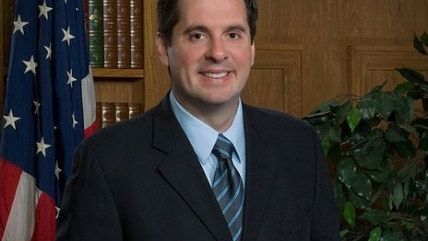Pro-Snooping GOP Rep. Claims Shock at Federal Surveillance of Flynn's Russia Call
Isn't this what actually authorized foreign intelligence gathering looks like?


Why it seems like it was less than a year ago that Rep. Devin Nunes (R-Calif.), chairman of the House Intelligence Committee, was actively trying to kill off proposed legislation that would require the federal government to get warrants to collect data on Americans. It was less than a year, actually: last June.
Back then there was a bipartisan push to try to require some more due process in National Security Agency (NSA) surveillance of Americans. Nunes used the deadly attack on the nightclub in Orlando to argue against it, claiming it would hamper the government in its fight against the war on terror.
But while he was opposed to protecting you and me from unwarranted government surveillance, apparently Nunes does think that the feds recording a call between ex-National Security Adviser Mike Flynn and a Russian ambassador in December is beyond the pale. From The Washington Post:
The chairman of the House Intelligence Committee said Tuesday that the most significant question posed by the resignation of national security adviser Michael Flynn is why intelligence officials eavesdropped on his calls with the Russian ambassador and later leaked information on those calls to the press.
"I expect for the FBI to tell me what is going on, and they better have a good answer," said Rep. Devin Nunes (R-Calif.), chairman of the House Permanent Select Committee on Intelligence, which is conducting a review of Russian activities to influence the election. "The big problem I see here is that you have an American citizen who had his phone calls recorded."
No, that's not actually the problem, oddly enough. As just about every story about the Flynn-Russia scandal has noted, the intelligence agencies regularly record phone calls between Russian diplomats and whomever they're talking to. This is actually one of the things most Americans expect foreign surveillance to encompass. Nunes is blurting out the classic "shocked to find gambling going on here" rejoinder, even complaining, "Where are all the privacy groups screaming now?"
There is the matter of how the Flynn call got leaked, the political implications, and the reality of faceless operators within the intel community using their tools to affect executive branch decisions. Being pro-leak (and I'm extremely pro-leak) shouldn't blind a person to the political agendas behind them (it's worth pointing out, though, that increased government transparency would diminish the potential of this secretive political maneuvering).
Right before President Barack Obama left office, his administration increased the authority of several federal agencies to share raw data collected from the very kind of foreign intelligence surveillance that happened in this case. National security surveillance journalist Marcy Wheeler noted that possibly thanks to this change in policy, the FBI would not need to get warrants in cases like this because it involves counterintelligence with another country.
It takes a particular bit of chutzpah to—after insisting that average American citizens shouldn't have formalized legal protections from unwarranted data collection—declare that a person heavily connected to the incoming presidential administration should expect his conversations with high-level Russian officials to be secret.
Note that I'm not arguing that it's wrong for Flynn to have had conversations or even wrong to have suggested sanctions might be eased (sanctions often suck as policy and so does the Logan Act). It is, however, incredibly cynical for the head of the House Intel Committee to play so completely and thoroughly dumb about what actually legal, authorized foreign surveillance looks like.


Show Comments (75)